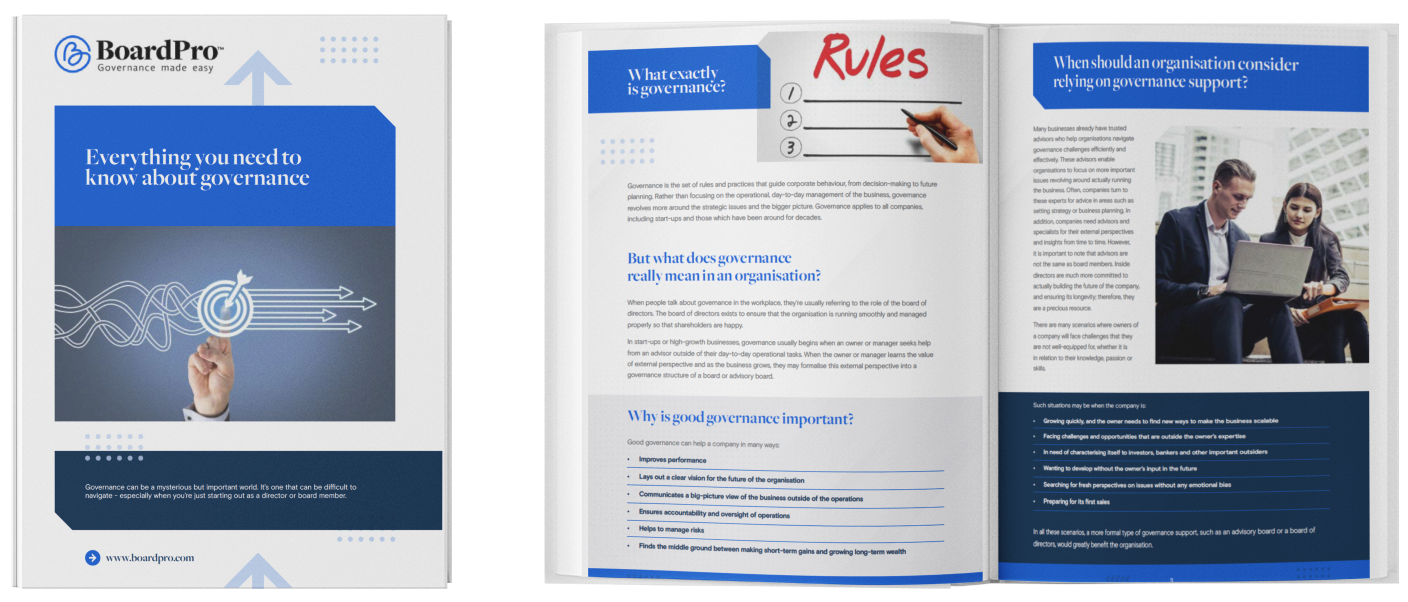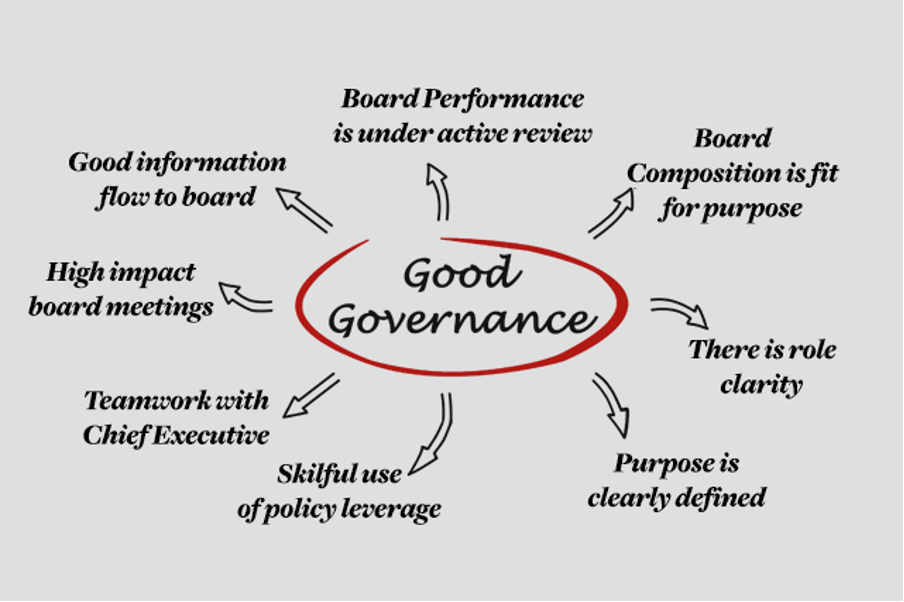Everything you need to know about governance
Governance is the set of rules and practices that guide corporate behaviour, from decision making to future planning. Rather than focusing on the operational, day-to-day management of the business, governance revolves more around the strategic issues and the bigger picture. Governance applies to all companies, including start-ups and companies that have been around for decades.
But what does governance really mean in an organisation?
When people talk about governance in the workplace, they’re usually referring to the role of the board of directors. The board of directors exists to ensure that the organisation is running smoothly and managed properly so that shareholders are happy.
In start-ups or high-growth businesses, governance usually begins when an owner or manager seeks help from an advisor outside of their day-to-day operational tasks. When the owner or manager learns the value of external perspective and as the business grows, they may formalise this external perspective into a governance structure of a board or advisory board.
Why is good governance important?
- Improves performance
- Lays out a clear vision for the future of the organisation
- Communicates a big-picture view of the business outside of the operations
- Ensures accountability and oversight of operations
- Helps to manage risks
- Finds the middle ground between making short-term gains and growing long-term wealth
When should an organisation consider relying on governance support?
Many businesses already have trusted advisors who help organisations navigate governance challenges efficiently and effectively. These advisors enable organisations to focus on more important issues revolving around actually running the business. Often, companies turn to these experts for advice in areas such as setting strategy or business planning. In addition, companies need advisors and specialists for their external perspectives and insights from time-to-time. However, it is important to note that advisors are not the same as board members. Inside directors are much more committed to ensuring the longevity and actual building the future of the company, and thus, they are a precious resource.
There are many scenarios where owners of a company will face challenges that they are not well-equipped for, whether it is their knowledge, passion or skills.
Some situations may be when the company is:
- Growing quickly, and the owner needs to find new ways to make the business scalable
- Facing challenges and opportunities that are outside the owners expertise
- In need of characterising itself to investors, bankers and other important outsiders
- Wanting to develop without the owners input in the future
- Searching for fresh perspectives on issues without any emotional bias
- Preparing for its first sales
In all these scenarios, a more formal form of governance support, such as an advisory board or a board of directors would greatly benefit the organisation.
So, how can governance help your organisation?
Improve performance
Depending on the business owner’s goals, governance can help improve the organisation’s performance. For example, some people are happy with a lifestyle business that provides them a steady income stream. In contrast, others want to continually improve their company’s performance to build a sustainable, valuable and scalable business that will eventually outlive them.
But before we get into how exactly governance improves performance, let’s discuss how performance relates to value.
Performance = value
Directors work closely with management to increase shareholder value, which is the value delivered to the equity owners due to increased sales, earnings and free cash flow. These eventually result in an increase in dividends and capital gains for the shareholders.
In other words, improving performance leads to better metrics, which adds value to the business. This value is measured by an increase in the company’s overall worth and perceived value, which can help win contracts with clients, create partnerships, raise capital, improve relationships with institutions, and increase financing capabilities.
Improving business performance is not a simple, straightforward or quick task. It requires tenacity and courage because it calls for tough decision making. Business owners need to know how to identify and stop things that are not working for the business and do more of the things that work well, and sometimes these decisions are not as easy as one may think. These tough decisions require having clear evidence and details on the business’s current finances, rather than relying on intuition or gut. Remember, data beats opinion every time.
For some small- and medium- sized businesses, improving business performance without proper reflection and evaluation can become a weakness. As these companies are often looking for any opportunities for growth, they will enthusiastically agree to a large order without taking the time to consider the indirect effects, such as increased stock costs, more credit and extra salaries.
Therefore, establishing a governance board and working with experienced independent directors will help ensure formal steps are put in place to measure and improve performance, thus increasing the value of the business.
Deliver through discipline
Boards meet with their management teams on a regular basis, decide who on your management team will present reports like:
- A simple two-page summary of progress on the business plan
- An overview of risks and other issues the company is facing
- A financial summary
Just preparing for the meeting alone is great motivation to get important information in order and stay up-to-date on the company’s performance. In addition, being accountable to the board usually adds healthy pressure on SME owners, helping them prioritise the work they spend “on” their business, instead of “in” it. The board will also ask for reports on key aspects of the company’s operations that are critical to the success of the business, known as key performance indicators (KPIs). Some standard KPIs include:
- Financial performance
- Human resources
- Marketing activities
- Product or business positioning
- Social and ethical responsibilities
- Legal and regulatory issues
- Organisational structure
- Industry trends

Sometimes, boards may opt for a report-by-exception format, which means the report explains business as usual. Below are three possible scenarios and how they are reported in this format:
- Nothing new to report - state that in one sentence
- Things are going better than expected - describe it in one paragraph
- Things are going worse than expected - detail the information on one page
Make strategic decisions based on the future
A board is only interested in past information to the extent that it helps create context. But, what they really want to know is what the future outlook is. By preparing forward-looking information and outcome prediction, a board can help make the most effective strategic decisions for the company.
Think bigger picture
Ultimately, the board is responsible for strategic planning, which must align with the company’s vision and goals. As a result, a governance board can help an organisation consider the bigger picture and seek answers to big questions to formulate a clear and achievable strategic plan.
Focus on strategic issues
As mentioned, the governance board must focus on the strategic issues, especially when the company grows. Some strategic issues include:
- Competition
- Industry trends
- New methods to increase productivity
- Technology breakthroughs
- Emerging markets
Work "on" the business
Management can be extremely busy juggling their plethora of responsibilities, so they struggle to find the time to work “on” the business. Because they are so focused on the daily operations and the tactics of the business, they often neglect the bigger picture and the entire business strategy. It’s not enough to just do the work for the business. They need to also consider how the business works.
Hiring a board of directors lessens the workload and helps management work “on” the business by painting a clear picture of the broader scope of the organisation. With this bigger picture spelled out, it will be much easier for business owners to work “on” the business.
Provide a long-term view of the business
Managing the day-to-day demands of a business often means making short-term decisions, rather than decisions that consider the future of the company. A board of directors helps take a strategic, long-term approach to the business.
Experienced directors will have lived through the life cycle of a company before, and:
- Understands the challenges involved in building an organisation
- Know the potential growth paths for the company
- Foresee and avoid pitfalls
- Provide confidence to make suitable decisions
Connect the dots
Big picture thinking gives business owners the ability to synthesis data. This means:
- Pinpointing overarching trends and themes in the world outside of the business
- Connecting the dots for strategic insight
- Developing the right responses to grow the company
Manage risk
Risks are inherent in every business, no matter what industry. Therefore, knowing how to manage and navigate risk is a really important task every company needs to do. To help, a strong board of directors can take a lot of weight off the owner’s shoulders by mitigating risks.
But first, what is risk?
Whether it’s setting up a new store, launching a new product, hiring new staff or expanding into new markets, there are always risks involved and taken. But in the end, these risks are taken because the potential for gains outweighs the possibility of loss.
Managing risk is all about gathering relevant information so you can make trade offs and calculate opportunity costs between different events. And a board plays a crucial role in making sure a company takes the necessary precautions when dealing with risk, while also maintaining the pursuit for adding value to the company.
Tap into experience
While all businesses have risks, different industries face different risks at various stages of the company’s lifecycle. Because of the diversity of risk a company faces, independent directors can offer their experience and insight to help. Independent directors are typically members of several boards, which can provide:
- Insight into different approaches to risk management
- Broad networks that can be tapped into for specific expertise
- General experience in assessing risk
High risk, high return
Risk often represents significant business opportunities. But sometimes, it can be difficult to measure trade-offs without experience. Independent directors can play devil’s advocate and challenge conventional thinking when risk arises. In turn, they can help a board frame risk as opportunities to potentially grow the company.
So what do directors do?
Directors set the vision and long-term goals of the organisation, plan the strategies to achieve the vision and monitor the strategy implementation. They are in charge of making sure the company complies with all legislations and remains financially solvent.
Directors vs senior management
Directors focus on the bigger picture, steering the organisation towards its goals and ensuring the day-to-day management of the organisation aligns with the organisation’s vision.
Directors do not replace the management team. In fact, they are actually quite different from each other. The two complement each other, where the management team works on the operations of the business while the directors plan long-term and offer financial oversight and insight knowledge.
Director's role
The director holds a key position in the organisation, as they have many responsibilities, including:
- Consider the strategic vision for the company
- Offer new perspectives, skills and knowledge
- Share extensive networks to help grow the organisation
- Act in good faith and in the best interests of the company
- Have no conflicts of interests with the company
- Ensure the company remains solvent
- Work with integrity and not take advantage of their position for personal gains, such as insider trading
Directors have influential power in meetings. When they come prepared, informed and ready to debate about a strategic future, they can help the board tackle issues from different angles and consider all options before making a decision. Whether it’s a general skill or specific experience, directors can contribute fresh perspectives and add value to the company.
What skills do directors have?
Competent directors should be able to contribute to an organisation through, but not limited to, the following ways:
- Experience – directors should bring their years of experience that they can readily tap into
- Network – directors have developed networks via their past experiences, which they should take advantage of to promote the organisation and gain knowledge from
- Fresh, diverse perspectives – directors should act as a new set of eyes to offer different viewpoints on current and future issues
- A long-term view – typically, directors commit for at least three years, but often stay much longer. This offers them the opportunity to understand the business completely and provide continuity
- Conformance – directors help monitor the performance of management and ensure the company is operating in the interests of shareholders and in accordance with laws and regulations
- Performance – directors set objectives and keep management accountable by overseeing their work and checking that it aligns with the vision of the company
- Transparency – directors encourage transparency between management and board members
- Risk management – with their past experiences, directors should help their organisations manage and reduce risk
Should you accept this board position?
An invitation to join a board is a big deal, and before accepting a board position, there are several things you need to consider.
So you've been asked to join a board
How do you assess whether the position is right for you? Your decision about whether to join a board depends on two basic questions:
- Are you personally and professionally ready for the position?
- Is the company suitable for you?
Let’s take a look at some factors to think about before you accept the position.
Motivation:
There are many reasons for wanting to join a board: desire to add value, broaden your skill set, try new experiences, expand your network and receive higher remuneration, just to name a few. While those are all benefits, joining a board position comes with personal responsibility and risk. You should not be swayed by loyalty, status, prestige or wanting to keep a “finger in the pie” after retirement, at least not without doing a thorough assessment of the risks involved.
Skills and experience:
Reflect on whether you have the appropriate skills and experience to complement other directors on the board and move the organisation forward with its strategic plan.
Time commitment:
Confirm that you have the time and availability to commit to the board before accepting the position.
Conflicts of interests:
Are you independent of the organisation, and thus can make unbiased decisions clear from emotional involvements? To be on the board of an organisation, you need to act in the best interest of the organisation rather than yourself.
Company suitability:
Joining a board position will require you to invest your time, effort and reputation in an organisation. Therefore, you need to make sure that the company is suitable for you. Below are a few factors you need to consider regarding company suitability.
The company’s financial position:
Consider the company’s financial position. Take a look at the financial statements from the past three years or more. Make sure that you are satisfied with their accuracy and reasons for any peculiarities.
Board capability and operation:
Reflect on the board’s vision and strategy, the leadership of the chair, the skills of the existing directors and the effectiveness of operations. Does the way this company operates align with your goals and wants?
Management capability and operation:
The skills and experience of the CEO and senior management matter. Dig deeper to learn more about the relationship between the chair and the CEO, the reputation of the company and the quality of the company’s risk management, as these will all contribute to your experience as a board member.
Directors’ liability insurance:
Ensure that the company’s constitution allows it to compensate for or insure director’s liability. Check the company policy on paying premiums and desirability for extra cover as well.
Board roles
The size and structure of the board varies between organisations. As a result, the number and the types of board members will vary between companies as well. That said, let’s take a look at a few common roles within the board.
Role of the chair
The chair plays a vital role in the operation of the board, as their primary duty is to set meeting agendas and run board meetings. Responsible for steering the meeting to clear solutions, the chair should invite all views from various angles and find a consensus to solve any management issues. It is also the chair’s responsibility to ensure all decisions are understood and recorded. And as the main link between the CEO and the board, the chair must lead the board and develop an effective governance culture and facilitate strong communication between the board and management.
Types of directors
There are three types of directors.
Executive
Executive directors have a dual role as employees of the company and as directors. As directors they:
- have responsibilities, but must retain a degree of independence from their executive role
- should be appointed as individuals, and not because of any position they hold within the company
- must always be alert to the potential for conflicts between their management interests and their duties as a director.
An executive director brings an insider’s perspective to the table which can be very valuable when discussing the operations of a company.
Non-executive
These directors bring an outside perspective to the table and often a wealth of knowledge and experience. A non-executive director may be representing a major shareholder but an independent director will generally have no other links with the company other than sitting on the board. The non-executive director’s principal role is to provide independent judgement. This includes:
- Outside experience and objectivity on all issues which come before the board
- Understanding the detailed knowledge of the company's business activities and on-going performance, so they can make informed decisions
- Recognising the division between the board and management
The boundary often gets blurred in SMEs. For example, a non-executive director may be appointed to fill a gap in knowledge and expertise, and end up assisting management in that area.
Independent
To gain true separation between management and governance it makes sense to include independent board members. Some owners can feel threatened by this independence, but in the end their outside thinking can enable the business to grow and develop valuable long-term strategy.
Committees of the board
Board committees deal with specific issues, from a takeover bid, a research project to a major commercial deal, all delegated by the entire board. Committees operate continuously and in conjunction with the board. Because committees are smaller, the idea is that they can work in greater detail and come to decisions quicker. Oftentimes, directors with specific skills are appointed to committees that require their relevant expertise. For example:
- The audit committee produces accurate financial statements and keeps the organisation accountable to necessary accounting standards. They are key players in providing additional oversight of the organisation’s finances. Members of the audit committee should, whenever possible, be independent non-executive directors.
- The nomination committee’s work concerns the appointment of directors to the board, aiming to maintain a balance and diversity of skills, knowledge and experience.
- The remuneration committee deals with remuneration-setting for directors, the CEO and sometimes senior management, in a transparent and objective manner.
Company secretary
The company secretary is the board administrator, ensuring that the board functions efficiently and following relevant legal and other requirements. In addition, the secretary assists the chair by organising papers, meetings, induction of new directors and other duties to ensure the smooth running of a board.

Download our latest eBook
Share this
You May Also Like
These Related Stories

Eight Characteristics of Good Governance

How to appoint a better board of governance
%20(1).png)

